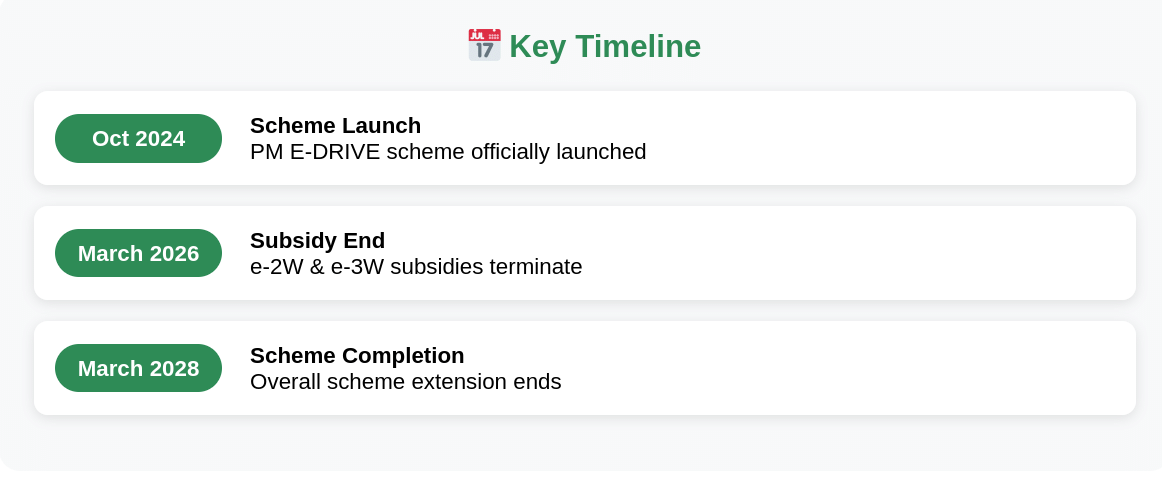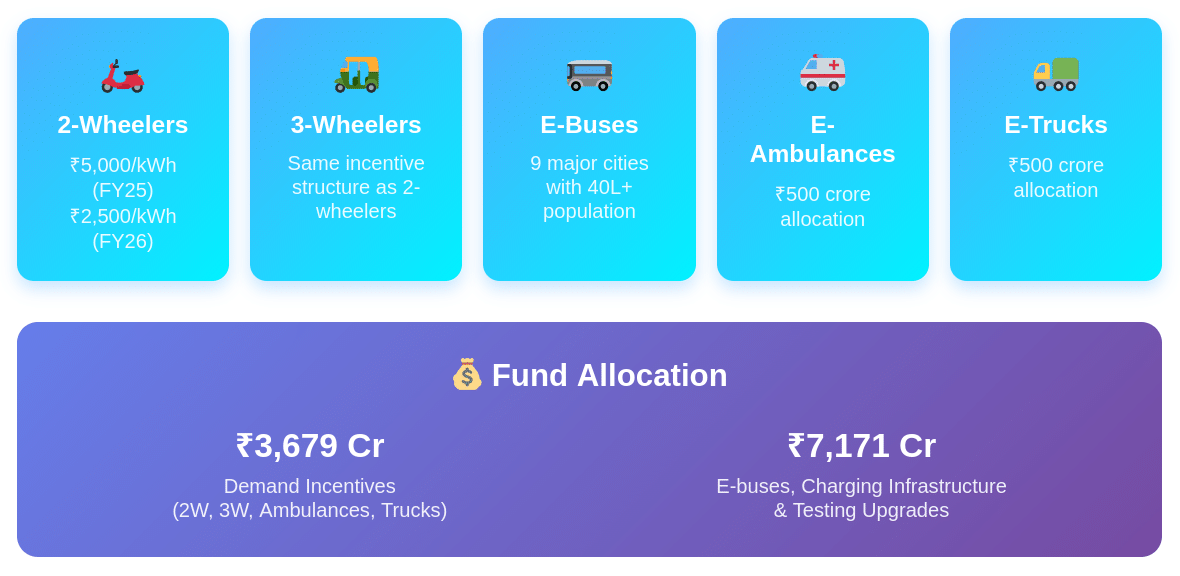The government has extended the Prime Minister Electric Drive Revolution in Innovative Vehicle Enhancement (PM E-DRIVE) scheme by two years, until March 2028, according to a notification from the Ministry of Heavy Industries. However, the subsidies on electric two-wheelers and three-wheelers will be terminated by March 31, 2026.
The Rs 10,900-crore scheme, which provides incentives on the purchase of electric vehicles and setting up charging infrastructure, was launched on October 1, 2024, and was initially supposed to expire on March 31, 2026. The recent notification extended the expiry date of the scheme to March 31, 2028.

PM E-Drive scheme comes with a target of providing demand incentives worth Rs 3,679 crore on the purchase of electric two-wheelers, three-wheelers, ambulances and trucks, while Rs 7,171 crore has been set aside to boost the adoption of electric buses, improve public charging infrastructure and upgrade testing infrastructure. The target is to support 24.79 lakh electric two-wheelers, 3.16 lakh three-wheelers and 14,028 buses and trucks, as well as 88,500 electric vehicle charging sites.
The government began subsidizing electric two- and three-wheelers from October 2024 under PM E-Drive scheme. However, subsidies for electric trucks were only announced in July 2024. Additionally, guidelines for subsidies on electric ambulances and supporting charging infrastructure are still being finalized.
“This is a fund-limited scheme. Total payout under the Scheme shall be limited to the scheme outlay of Rs 10,900 crore. In case the funds for the Scheme or its relevant sub-components are exhausted prior to the terminal date of the Scheme i.e., March 31, 2028, then the scheme or its relevant subcomponents will be closed accordingly i.e. no further claims will be entertained. However, the terminal date for registered e-2W, registered e-rickshaws & e-cart and registered e-3W (L5) shall be March 31, 2026,” the notification said.

Autocar Professional had previously reported that the government is likely to end the demand incentives for electric two-wheeler and three-wheelers as senior officials believe that only those segments that have not reached 10% electric vehicle penetration will require demand incentives from 2026.
The subsidies given on the purchase of electric vehicles are instrumental in driving the early-stage adoption of electric vehicles as incentives help in reducing the upfront cost of the vehicle. As EV adoption grows, the government has been progressively scaling back subsidies, signaling a deliberate policy shift away from fiscal dependency.
The PM E-Drive scheme started with a subsidy of Rs 5,000 per kWh for electric two-wheelers in October last year and a cap of Rs 10,000 per vehicle. The incentive was halved to ₹2,500 per kWh in April this year. Electric rickshaws were getting a subsidy of Rs 5,000 per kWh with a cap of Rs 25,000 per vehicle, while passenger and cargo electric autos received a subsidy of Rs 5,000 per kWh with a cap of Rs 50,000 per vehicle last year. These subsidies were also halved from April 2025.
In July this year, the government came out with guidelines for electric truck subsidies, which says incentives are applicable for electric trucks with gross vehicle weight exceeding 3.5 tonnes but not more than 55 tonnes. The incentive will be calculated as ₹5,000 per kilowatt-hour (kWh) of battery capacity, or up to 10% of the vehicle’s ex-factory price, whichever is lower.
For electric ambulances, the guidelines are expected to finalised by the end of this year. “One electric ambulance was homologated last month and other OEMs are in the process of making electric ambulances. We expect that by December or January, electric ambulances will be out,” said Hanif Qureshi, additional secretary at the Ministry of Heavy Industries said recently.
One of the major highlights of PM E-Drive has been its higher focus on supporting the charging infrastructure. The scheme targets to support 22,100 fast chargers for four-wheelers, 1,800 for buses, and 48,400 for two and three-wheelers with an outlay of Rs 2,000 crore. The guidelines are subsidies to be given for setting up charging stations are also being finalised.
